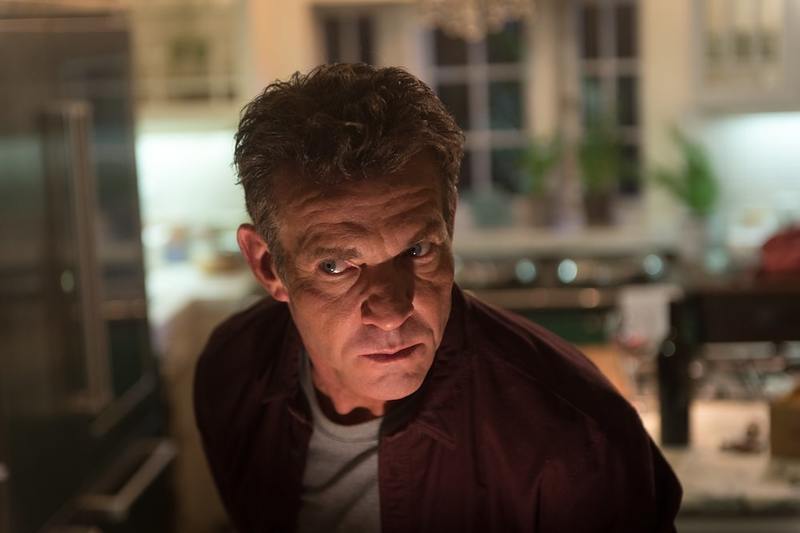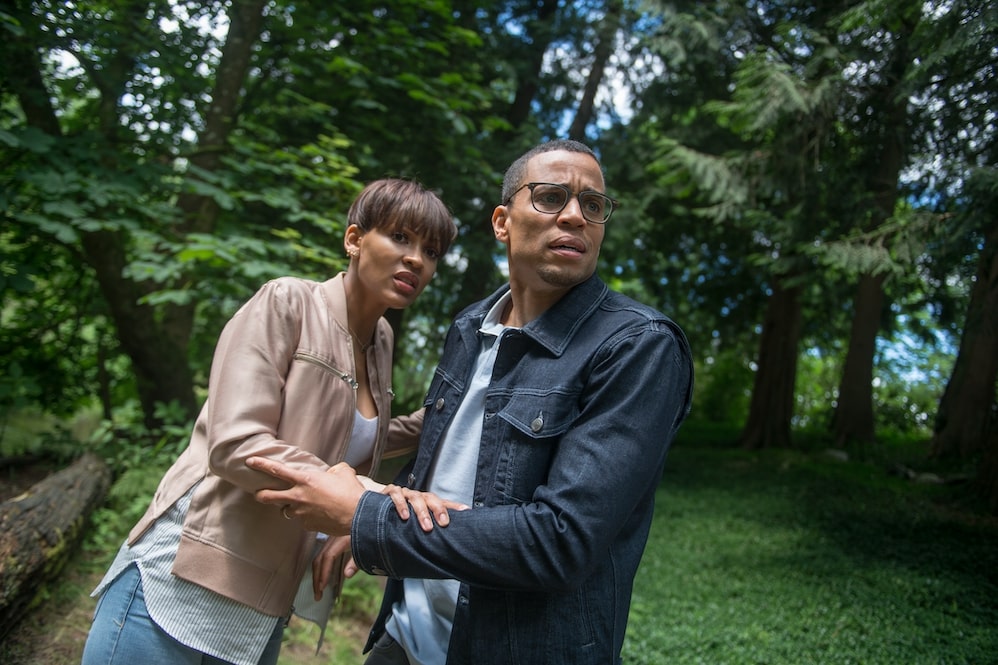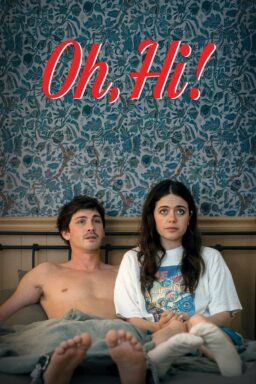One of the loudest theater experiences I’ve ever had occurred last Thursday night in a packed Chicago theater. It was at screening of “The Intruder,” a “don’t-do-it-man!” thriller with a wacko Dennis Quaid invading the personal space of a married couple played by Meagan Good and Michael Ealy. Before the film, Good prefaced to viewers that it was an “interactive movie,” and “The Intruder” became a surround sound experience even the loudest blockbusters couldn’t touch: theatergoers were screaming and laughing at the screen from start to finish. When Good’s genuinely sincere Annie decides to invite Quaid’s undoubtedly murderous Charlie inside for pizza, I’ve never heard an audience’s disapproval expressed so loudly yet lovingly.
A key piece to “The Intruder”‘s self-aware game of boundaries is the compassion expressed by Good’s Annie. She helps make it believable as to why the pushy former homeowner of the couple’s new love nest would keep being let inside, despite her husband Scott’s many tense interactions with Charlie. It’s all a testament to her talents as an actor: Good has had an all-star camera presence since her first big film role with 1997’s “Eve's Bayou.” Recently, she was in both the superhero comedy “Shazam!” and a one-take relationship drama that played Sundance called “A Boy. A Girl. A Dream.”, directed by Qasim Basir.
Written by David Loughery, “The Intruder” is the latest project from director Deon Taylor, who has become a prolific force across independent horror and comedy. His 2014 thriller “Supremacy” cast Danny Glover opposite a murderous, home-invading white supremacist (as based on a true story), and its followup “Meet the Blacks” brought a wacky satirical edge to the “Purge” movies. Now, a year after his human trafficking story “Traffik” (starring Paula Patton), Taylor’s 2019 filmography includes “The Intruder,” a sequel to “Meet the Blacks” and the cop drama “Black and Blue.”
RogerEbert.com sat down with Good and Taylor to chat about “The Intruder,” the huge reactions they got from their audience, why Good loves acting in horror movies, the status of Good’s debut as a director and more.
Last night’s screening was as loud as Woodstock, especially after you introduced it as “an interactive movie.” I thought that was really interesting, that you were encouraging people to loudly react to stuff they even didn’t agree with. So what’s the line for you guys when it comes to creating horror, but also being a little cheesy and self-aware?
DEON TAYLOR: I think when Meagan promoted that last night, it was a really good idea because what she’s doing is regurgitating over the last two weeks with the film. We’re literally … and even with Sony testing the movie, everywhere they’ve been it’s been that reaction, people are screaming at the screen. Last night was just the first time, I think she was like, “Yeah, go ahead and do it. Everybody else in the country doing it.” And it was fantastic. And part of the framework to this genre of film is to allow people to drop into those characters, and actually be in the movie. And you can’t do that without superior acting. A long time ago, you watch the first “Halloween” or “Friday the 13th,” you don’t really care about them kids, you’re really rooting for Jason to get ‘em. “Get ‘em! Get her ass!”
This movie is the exact opposite, you’re like, “Girl, run! Jump! Don’t do that!” Because you care. I think the more we do this, I’m just honored for the time that we’re doing it, standing next to her, standing next to Dennis Quaid. As a filmmaker, I’m just soaking in all of the moments. Because you don’t get to do this, man. You really don’t. Some people sit back and be like, “I put the camera here because I felt like … ,” man, shut up. Sometimes you put the camera there and magic happens, you know what I mean? It’s one of those movies where it’s magical, man. It really is. Once you start seeing thousands of people, you could go in the theater and be like, “Watch this right now, three, two, one … ahh!” And you got something. I think that’s what’s great about it.
MEAGAN GOOD: I’d say to give Deon credit, even though he’s being super humble, he directs as a director in his own way, and he also directs as an audience member. He’s intentional about certain beats and certain moments. A lot of that stuff that happens when we’re like, “I don’t feel like she should do this because people are going to be mad,” he’s like, “No, that’s the moment. That’s the moment where they’re like, ‘girl do this! Do that!’” For me, once I leaned into the idea of that, and figured out how she organically gets there without judging the process, whether you agree with her or not, it needs to be understandable where her mind is and the type of person that she is. And it’s cool because to now see everyone really react, a lot of the way that he knew they would and a lot of the ways that were unexpected as well.

So how do you keep it real, or real enough?
DT: All of those things are human moments. And I use the word “realism” a lot. Because I feel like that’s the only way to direct a film. And here’s the thing, and I will say this to my credit—I’ve lived a life, so far. I know the movies, but I’m really, really out here. I’ve been in the streets, I’ve been in relationships, I really had stuff fall apart, I’ve really been told no. I’ve been jumped. I just really know that world, and know how different things work. And the same exact way how Annie opens the door in the movie, and everyone goes, “Oh my god,” is the exact same way. I understand why their relationship needed to be a little bit flawed. These things were not written in the original script that way. Because I know what’s real, you know what I mean? Intention and relationships are real. Sometimes people are not getting along in marriages, sometimes people have other things they’re thinking about when they’re in relationships, and that’s when evil sneaks in and does what it does. I felt like this movie has a pulse outside of Dennis Quaid being the most amazing that he’s ever been, in his life. Outside of that—I feel there’s a line in the film where it’s like, “Man, I really know who Scott and Annie are. I’m that person. I’ve been that.” You get those kind of moments, you know what I mean?
And I think those are important in those little subtle lines. And just to make one more point, turning the movie on its head—African-American actors in a thriller, right? The first logical thing you would say in this movie, and you watch it and you see people like, “Oh, I’ll just get the gun, get the strap, and I’m gonna POW POW POW! I’m a take Charlie out.” Right? Well, here’s what’s really dope to me about the movie: the lead African-American man in the movie does not like guns. Gun violence has affected him in some type of way, and he is now not a fan and don’t want anything to do with them. That’s something I’ve never seen in cinema. I’m being honest. And it’s a small line in a thriller film. But it’s a line. And it’s something where people go, “Damn, OK.” And yesterday when you watch that film, I’m just looking at all of the lines we drew, you hear someone go, “Ohhh, here we go! He gonna have to use one!” And now all of the sudden, it means something now. Without giving away the movie, but that moment meant something. I just think the movie is very smart in a lot of ways, with the acting and the performances, and some of the small realism that we dropped in as partners.
Meagan, your character’s compassion is such a crucial base for this movie. You believe that Annie would let Charlie in on a numerous occasions, even if you wouldn’t do so yourself. How did you guys go about forming that, and being sincere to that?
MG: A lot of that was in the script, a lot of that we reworked. The pizza scene was actually in the “living room by the fire hangout” scene. It was crazier and we pulled it back to make it a little less. But, a lot of the stuff we just figured out on the day. We’d sit there and we’d conversate and we’re like, “OK, what do we do, how do we want to do it?” Sometimes our writer would be there and rewrite it right then.
DT: And I think that was the difference of the culture, for me as a black filmmaker. There’s some stuff you would write and then I’m reading it and we get there on the day and I’m like, “Man, we don’t really do that. That would be the end of the movie if you do it this way.” [laughs] “Oh, I didn’t really realize that!” “Yeah, we do it this way.” For Charlie to be in the house when you get home and cooking dinner, “No, we wouldn’t really do that.” So now it’s like, even teaching the writer sometimes, “Yo, this is how I build.” That’s also another balancing act as a director, if you’re working with the writer, it’s like telling him, “Here’s the story I want to tell from your words.” [Meagan] was great man, because some of those moments are compromising. As an actress, you’re saying, “OK, you want me to throw away a little bit of my intellect to play this role.” And I’m like, “Yeah, because she can’t see what I’m seeing inside the movie. Charlie is one way with her, all the time. And he’s a completely different way with her husband, all the time.” She doesn’t ever see Evil Charlie, she only sees sad, hurt, I Don’t Have Anywhere to Go Charlie.

Meagan, when it comes to the third act and the moment you face the truth about Charlie, that’s a big, classic horror moment. How does getting into that terrified mindset differ compared to other emotional roles?
MG: It’s the most heightened feeling that you can feel, and that’s what I love about this genre. People go, “Oh, horror movies are just … you know.” And I’m like, “No. In every other movie you go through experiencing whatever the character is going through. But in this genre, you go through experiencing, How do I survive? How do I live? At what point does this kick in? At what point do I feel like I’m not going to make it? At what point do I decide that it doesn’t matter if its life or death? All of those different things, and you have to pick and choose where to put it, that it can be gratifying at a certain point to the audience. I just love, love, love that feeling. To even be on set and to go there, it just reminds you that you’re living life. And it just makes you think whether you’re in that situation, and the you start asking yourself, “What would I do?”
I’m thinking about your face when you’re in a certain creepy location in the movie. I was trying to imagine what you were thinking as an actor.
MG: Yeah, and also you’re imagining but you’re also living it. That world becomes real to you in that moment, as much as humanly possible. But that stuff is fun to me. It’s my favorite thing.
I have to ask about that in comparison with the one-take work of “A Boy. A Girl. A Dream” – I imagine that’s another intense requirement as an actor. How does doing a one-take movie compare to doing a horror project?
MG: It’s two totally different things. With “Boy Girl Dream,” it was like a play. You had to memorize the entire script at once and know it all, and that script was really about 60 pages, and the other 40 pages was what we said t make it flow and make it natural, and to not really be able to cut. You need to know if you do cut, you have to start all the way over, it doesn’t mean if you’re a half-hour into it. That is a lot of pressure and that for me was like a challenge. “The Intruder” was a challenge as well, and there is a lot of things going on in your head. But for me as an actress, it’s extremely gratifying to go to places that you don’t typically go to in any other scenario. At the end of the day in life, we want to live. That’s one of the things we desire most on this planet, is to live. And to be in a place where that is being comprised makes you thankful, and it’s also fun [laughs]. You walk away extra grateful.

Deon, one thing that stands out about your movies is your focus on white invaders, which happens not just with “The Intruder,” but also “Supremacy,” “Traffik,” and “Meet the Blacks.” You do it across different tones in horror and comedy, and sometimes race is not even discussed by the characters. But what’s your interest in presenting that type of menace? Do you get any pushback? Not many directors are doing that.
DT: “Supremacy,” I honestly did that as a completely true story. I did that film based on the fact that I wanted to tell that story because what I thought was interesting about a white supremacist who has been in prison for 15 years and kills a police officer in a couple hours, is that racism was trained. At the end of that film, he finds out that him and [Danny Glover’s character] are the same type of people. It wasn’t even about color. I did that one, and “Traffik,” we never made any reference to race in that film. People just perceived through the trailer that it was some white guys on motorcycles. Yeah, and the movie was really about guys who were trafficking. I’m not afraid to play in race-related things, but that’s also because I’m an independent guy. I don’t have to, a lot of times you get films that pull back or people water stuff down because they’re afraid of making the wrong statement. I’m a filmmaker, man, and part of the art is to just do what you do, and say what you say. You get into situations like this with “The Intruder,” and here everyone is like, “Oh man, I know what that’s going to be!” And you go right in there and there’s not even one dialogue or one word about any colors. I just think that’s good filmmaking, man. I think there’s a necessary time to say something, and there’s a time when you don’t need to say anything at all. I think being a good director is knowing when those moments are.
You made me think about “Supremacy,” man. That movie won a lot of awards. That movie actually spun me into a weird place, man, because I so wanted to get that film nominated. It spun me into a comedy. That movie made me so mad, after I did not get all of the awards I wanted, I was like, “Dude, I’m not doing no more dramas I’m not doing more thrillers, I’m just gonna do comedy.”
And now you’ve got a franchise, with “Meet the Blacks 2.”
DT: I sure do. And I’m happy about it. It’s fantastic. Now that movie, there’s a race! They push all the buttons. I’m like, “These dudes is crazy!” [laughs] We got the Klan and everybody else in that one.
Meagan, can you tell us about your directorial debut? When can we see it, what’s it about?
MG: We just finished everything, so we’re gonna be premiering at ABFF (the American Black Film Festival). I’m just super proud of it, and super excited about it. It’s the story of four best friends, and we basically meet them when they’re 17. The movie starts with one of them having a baby on the bathroom floor of her high school, and you meet them 15 years later. My character is that one. At this point in her life she’s addicted to opioids, and one of the characters is dealing with going through a divorce, and she falls in love with another guy and come to find out she can’t have kids, and that’s an issue that’s plagued her. Another woman, she’s had a son but her husband left her because it’s a “me or the career” type thing, she started her life over, and then he came back into her life and they repair the relationship before she gets a huge opportunity for her career. And then the other character is pregnant with her husband who she doesn’t live anymore’s baby, who’s been cheating, and they have all these issues and she falls in love with somebody else. Every woman is dealing with something different, and they’re kind of things that we don’t really explore on screen, but they’re constantly happening around us.
DT: That sounds dope. I want to see that!
MG: It’s really just about sisterhood and friendship. To me, it was like a callback to “Waiting to Exhale.”
DT: Uh, I smell awards! I smell awards in your future, Meagan! A lot of them!












